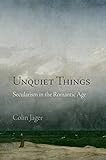Unquiet Things : Secularism in the Romantic Age / Colin Jager.
Material type: TextSeries: Haney Foundation SeriesPublisher: Philadelphia : University of Pennsylvania Press, [2014]Copyright date: ©2015Description: 1 online resource (344 p.)Content type:
TextSeries: Haney Foundation SeriesPublisher: Philadelphia : University of Pennsylvania Press, [2014]Copyright date: ©2015Description: 1 online resource (344 p.)Content type: - 9780812246643
- 9780812290400
- English literature -- 18th century -- History and criticism
- English literature -- 19th century -- History and criticism
- English literature -- 18th century -- History and criticism
- English literature -- 19th century -- History and criticism
- Religion and literature -- Great Britain -- History -- 18th century
- Religion and literature -- Great Britain -- History -- 19th century
- Religion and literature -- Great Britain -- History -- 18th century
- Religion and literature -- Great Britain -- History -- 19th century
- Romanticism -- Great Britain
- Secularization (Theology) -- History -- 18th century
- Secularization (Theology) -- History -- 19th century
- Secularization (Theology) -- History -- 18th century
- Secularization (Theology) -- History -- 19th century
- Theology in literature -- History -- 18th century
- Theology in literature -- History -- 19th century
- Theology in literature -- History -- 18th century
- Theology in literature -- History -- 19th century
- Cultural Studies
- LITERARY CRITICISM / European / English, Irish, Scottish, Welsh
- Cultural Studies
- Literature
- 820.9/382 23
- PR448.R45 J34 2015
- online - DeGruyter
- Issued also in print.
| Item type | Current library | Call number | URL | Status | Notes | Barcode | |
|---|---|---|---|---|---|---|---|
 eBook
eBook
|
Biblioteca "Angelicum" Pont. Univ. S.Tommaso d'Aquino Nuvola online | online - DeGruyter (Browse shelf(Opens below)) | Online access | Not for loan (Accesso limitato) | Accesso per gli utenti autorizzati / Access for authorized users | (dgr)9780812290400 |
Frontmatter -- Contents -- Introduction. Unquiet Things -- PART I. Reform -- Introduction -- Chapter 1. The Power of the Prince: Henry VIII and Henry VIII -- Chapter 2. The Melancholy of the Secular -- Chapter 3. Wishing for Nothing: Emma and the Dissolution -- PART II. Sounding the Quiet -- Introduction -- Chapter 4. Coleridge at Sea: ''Kubla Khan'' and the Invention of Religion -- Chapter 5. Hippogriffs in the Library: Realism and Opposition from Hume to Scott -- Chapter 6. The Creation of Religious Minorities: Hogg's Justified Sinner -- PART III. After the Secular -- Introduction -- Chapter 7. Byron and the Paradox of Reading -- Chapter 8. The Constellations of Romantic Religion -- Chapter 9. Shelley After Atheism -- Epilogue -- Notes -- Bibliography -- Index -- Acknowledgments
restricted access online access with authorization star
http://purl.org/coar/access_right/c_16ec
In Great Britain during the Romantic period, governmental and social structures were becoming more secular as religion was privatized and depoliticized. If the discretionary nature of religious practice permitted spiritual freedom and social differentiation, however, secular arrangements produced new anxieties. Unquiet Things investigates the social and political disorders that arise within modern secular cultures and their expression in works by Jane Austen, Horace Walpole, Samuel Taylor Coleridge, Lord Byron, and Percy Shelley among others.Emphasizing secularism rather than religion as its primary analytic category, Unquiet Things demonstrates that literary writing possesses a distinctive ability to register the discontent that characterizes the mood of secular modernity. Colin Jager places Romantic-era writers within the context of a longer series of transformations begun in the Reformation, and identifies three ways in which romanticism and secularism interact: the melancholic mood brought on by movements of reform, the minoritizing capacity of literature to measure the disturbances produced by new arrangements of state power, and a prospective romantic thinking Jager calls "after the secular." The poems, novels, and letters of the romantic period reveal uneasy traces of the spiritual past, haunted by elements that trouble secular politics; at the same time, they imagine new and more equitable possibilities for the future. In the twenty-first century, Jager contends, we are still living within the terms of the romantic response to secularism, when literature and philosophy first took account of the consequences of modernity.
Issued also in print.
Mode of access: Internet via World Wide Web.
In English.
Description based on online resource; title from PDF title page (publisher's Web site, viewed 30. Aug 2021)


